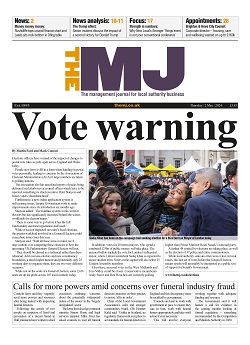To readers of The MJ, the management of migration is straightforward. Migration is good for the UK but creates public service pressures. If there is funding to manage these, all will be well. Of course, all is not well.
The backlog of cases at the Home Office allied to a shortage of housing and other accommodation almost everywhere is creating real problems. Nonetheless, this is an issue of management, not of principle.
One form of migration does raise issues of principle: the irregular arrivals via small boats. The tragedy of each boat that sinks, the stories of individual human misery people bring with them and the ever-present risk of human slavery are issues of first order concern.
With irregular migration by boat accounting for no more than 8% of net migration, a rational view today would still be that the costs to public services are something we should be able to manage like any other pressure, enabling government national and local to fulfil its duty to people who seek asylum.
Delving into the statistics shines a light on the much more complex underlying issues. Last year saw some 48,800 attempted irregular arrivals by boat to the UK, the largest number of whom came from Albania (12,300). There were some 8,600 Afghan arrivals.
Those from Iran numbered 5,600 and from Iraq, 4,400. Some 2,900 arrived from Syria, 1,900 from Eritrea and 1,700 from Sudan. This distribution tells us three important things.
The largest number of these arrivals come from countries where there is or has been either a civil or military war. The United Nations estimates that some 108 million people were displaced by war and persecution in 2022. That is up from 89 million in 2021 and has risen inexorably since 2011 when there were 39 million people.
Of course, war and conflict drive regular as well as irregular migration, covering those arriving from Ukraine and arguably, from Hong Kong too, as well as those already listed.
There is every reason for us to expect more war in the years ahead as climate change creates disruption, bites on crop harvests and water scarcity drives conflict.
Following the Russian invasion of Ukraine, disruption to world trade led to massive spikes in commodity prices and an immediate hike in the cost of grain. The Black Sea agreement for the passage of Ukrainian grain eased the situation.
Russia’s decision to withdraw from this agreement will exacerbate matters. Since much of sub-Saharan Africa relies on Ukrainian and Russian grain, which is now being used by Russia as a political bargaining chip, the price is being borne in the parts of the world least able to feed themselves.
The world had remarkably good crop yields last year. This year may well be different. One recent estimate suggests that the 2023 European cereal harvest will be its lowest since 2007, some 9.5% lower than the five-year average.
As UN secretary-general, António Guterres, warned, last year: ‘If we do not feed people, we feed conflict’. In the period to 2016, the UN estimates around 21.5 million people a year were forcibly displaced every year due to climate related events.
One recent estimate implies a doubling of that number suggesting 1.2 billion people could be displaced globally by 2050 due to climate change and natural disasters.
If anything like this were to happen, even well-functioning systems of migration and effective deportation mechanisms will not readily manage what could easily become a major issue across the world.
The germ of an answer perhaps lies in the third finding from the statistics above, relating to Albania. The UK Albania agreement, like that between the European Union and Turkey following the war in Syria, was a diplomatic initiative that stemmed the flow of migration. From some 28% of total arrivals in 2022, irregular Albanian migration fell virtually to zero early this year.
We need a better system and legal routes for new arrivals of every kind. But, in a world of climate change and seemingly increasing levels of conflict, we need to prepare ourselves for more irregular migration whatever we do on our own shores. But this is not an argument for punitive nationalism. We need to learn from what we have experienced repeatedly in modern times.
If places like the UK and the EU work with those in the Middle East and North Africa to rebuild their economies and civil societies –a possible and desirable quid pro quo of co-operation – we would improve our own security and enable them to benefit from the migrants they could absorb to rebuild their economies after prolonged periods of instability and war.
Doing so would benefit our businesses as happened for American companies under the Marshall Plan in Europe after the Second World War and as the EU did more recently in central and eastern Europe. If this seems a long way removed from the day-to-day life of British local government, it shouldn’t.
It is local leaders and our communities that bear the costs of failed policies – domestic problems such as poverty and poor education – or those which arrive at our shores.
Communities benefit from well-managed migration as new arrivals breathe life into towns and cities across the country – especially when people are allowed to work.
For now, as on other issues we are writing about at the moment, our argument to local leaders is that it is time to get serious. We are not having the migration debate we should have, stepping beyond well-worn lines of debate. The world is changing around us and we need to change how we work with it. We will live to regret it if we don’t.
Mike Emmerich is a founding director of Metro Dynamics
@metrodynamics



